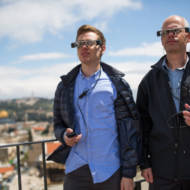

(Shutterstock)
Israel’s ability to turn limitations into advantages is one of the factors that has fueled its rise as a tech power, a Forbes analysis explained Sunday.
Because Israel has limited natural resources, it has instead been devoted to “maximiz[ing] the intellectual capacity of its people,” which meant that “its economy naturally gravitated towards knowledge and innovation-heavy industries.” Additionally, Israel’s lack of fresh water forced it to become a global leader in water technologies. And due to an Arab boycott and a relatively small population, “many Israeli companies focus on high-tech industries such as software and Internet where scalability is not restricted by borders or transportation costs.”
Forbes acknowledged the role of the IDF—especially Unit 8200, its signal intelligence corps—in fostering Israel’s high-tech engineers and entrepreneurs. It also pointed out that Israeli universities have created their own tech eco-systems. Beginning at the Weizmann Institute in 1959, Israeli universities established their own technology transfer companies to commercialize the results of their research.
Yissum, the technology transfer company of the Hebrew University of Jerusalem, is credited with 9,300 patents and has spun off 110 companies in its 52-year history. The licensing of commercialized products generates $2 billion in annual sales with the company earning 3 to 5 percent in royalties, Dana Gavish-Fridman, Yissum’s vice president of marketing, told Forbes. 60 percentof the income is used towards hiring researchers and improving laboratories.
The military’s role in Israel’s growth as a tech giant was fueled by research and development—which made up as much as 30 percent of the overall military budget during the 1960’s and 1970’s. Products were eventually adapted for civilian use, leading to such devices as the USB flash drive. Other military needs, especially those involving “big data,” have led to Israeli companies becoming sought out for their data capabilities. One IDF veteran named Gil Shwed used his expertise in firewall technology to found CheckPoint, now one of the world’s leading cybersecurity firms.
Unit 8200 is often the starting point for many high-tech entrepreneurs. A rigorous screening process ensures that the unit receives the top math and science students. Their work in the unit fosters an ability to think creatively, offering opportunities to gain higher levels of responsibility.
Natia Golan, the director of product management at BioCatch and an alumnus of Unit 8200, told Forbes that soldiers in the unit must be creative problem-solvers, building useful skills for the future. “One of the most important things [in Unit 8200] was to be open-minded, to think about every problem in a different way and not to give an answer at the beginning,” he said. “A lot of the best solutions in the unit was because people thought of solving thing in very different ways. We do new stuff all the time.”
Israel has also been able to attract top companies to build headquarters in the country. Microprocessor giant Intel has had a presence in Israel since 1974. Not only has Intel become Israel’s biggest tech employer, it has also produced and exported over one billion processors from Israel, including the 8088, which was the first processor for personal computers, and the Pentium MMX, which was the most popular processor in the 20th century.
More than 250 global companies have R&D labs in Israel today, with 80 of them being Fortune 500 companies. Two-thirds are American tech giants such as Facebook and Apple, but there is an increasing presence by Chinese and Korean players such as Huawei and Samsung. Some build greenfield operations, while others acquire smaller companies which they build upon – out of HP’s eight R&D facilities in Israel, seven evolved from buyouts. “If you’re a multinational company today, one of your assets would be a R&D center in Israel,” says Yair Snir, a director of M&A and business development at Microsoft EMEA. “Especially if you’re looking for an innovation hub and adding an extra mile to do things differently.”
Forbes also observed that Israel’s reputation as a “Start-up Nation” is well-deserved, noting that “between 1999 and 2014, Israelis started 10,185 companies, with half of them still in operation and 2.6% having annual revenues of over $100 million.”
Forbes’s look at Israel’s hi-tech industry is scheduled to be the first of two articles. Other publications that have explored Israel’s hi-tech success in recent months include Bloomberg, Yahoo! Tech, and The Washington Post.
By: TheTower.org
Do You Love Israel? All Gifts DOUBLED!
Want to do something important for Israel? Make a donation to United with Israel, and help to educate and inspire millions around the world to support Israel too!
And for a limited time, your gift will be matched. That means DOUBLE the impact for Israel!
Now more than ever, Israel needs your help to fight the battle of public opinion. Israel’s enemies are using social media to incite brutal terror against innocent civilians. We need your help to fight back.
Help defend the truth about Israel to millions of people around the world. UWI also contributes to vital charity causes like building bomb shelters to protect Israeli citizens. Please show your support today!
Source: United with Israel

